A Conversation with Public Media Institute
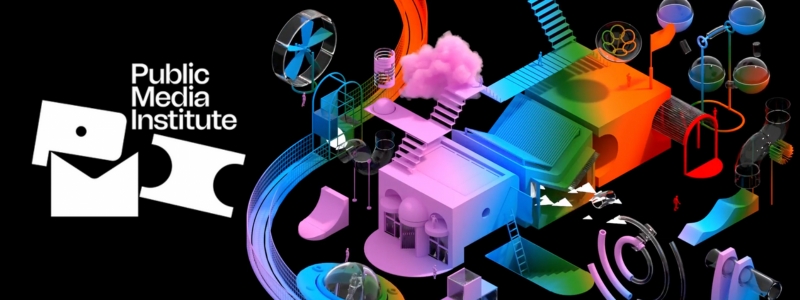
Though I have been an enthusiastic fan of the work of the Public Media Institute (PMI) and all its manifestations for some time, I did not meet its Managing Director Nick Wylie until 2024 at an event at Co-Prosperity, a cultural space that PMI facilitates. We were introduced by a mutual friend who was stunned we didn’t already know each other. In millennial fashion, we Insta-searched one another only to find we were already following one another.
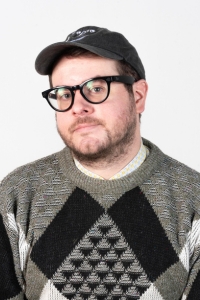
We live in a city with an embarrassment of cultural treasures and I have always felt that the work of PMI and what it represents is among those jewels. I have been professionally enamored of them for some time, and when the opportunity to collaborate on our Berlin public programs appeared, I leaped at the opportunity.
The themes animating PMI’s work mirror those of Berlin, Court’s world premiere adaptation of Jason Lutes’s graphic novel. Berlin is a mosaic of interconnecting stories told in 1928, a time of ascendant fascism. We see characters support one another, form networks of mutual aid and support, and challenge hegemonic and harmful systems through the power of collective action. For this reason (and for many others), I was inspired to collaborate with them on part of our Berlin public programs series, centering themes of Resistance & Resilience.
I got the chance to speak with the Founding Director, Ed Marszewski, and Managing Director, Nick Wylie of PMI about the inner workings of this dynamic organization—or should I say, this living, breathing, and evolving organism. Read along to discover what I learned and why I was even more inspired to collaborate with them on part of our Berlin public programs series.
How did the Public Media Institute come into being?
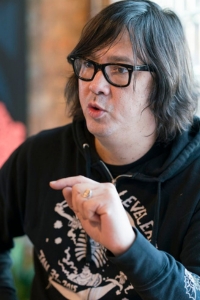
Ed Marszewski: Public Media Institute (PMI) was born out of the same ethos that fueled Lumpen Magazine: a belief in creating independent cultural platforms outside the grip of mainstream media and corporate influence. By the early 2000s, after years of publishing Lumpen, organizing festivals, and experimenting with alternative media, it became clear that a more structured, sustainable model was needed to support these efforts. PMI was founded as a nonprofit to ensure that the work—building spaces for radical art, resistance, and community media—could continue and expand.
At its core, PMI is a strategy for survival and transformation. It evolved as an umbrella for projects like Lumpen Magazine, Lumpen Radio, Co-Prosperity, and a network of spaces, events, and publications that amplify underrepresented voices. It’s a continuation of the DIY (or rather, DIT—Do-It-Together) philosophy that has always driven us: make the media you want to see, create the spaces you need, and build the networks that keep you and your people going.
PMI wasn’t just a practical move—it was a way to formalize a decades-long commitment to independent, community-driven media and culture. It was about ensuring that Lumpen and its extended orbit of artists, organizers, and activists had a lasting infrastructure to keep producing, resisting, and dreaming up new worlds.
Can you tell us more about the Buddy System network and its ethos?
Nick Wylie: The Buddy System is a collaborative network based in Chicago, encompassing a diverse array of businesses, non-profits, publications, and creative individuals. This ecosystem is dedicated to fostering a community-driven future through mutual support, platform building, and innovative ventures.
Central to the Buddy System is the Public Media Institute (PMI), a 501(c)(3) non-profit organization committed to art and culture. PMI amplifies the voices and products of for-profit entities within the network, ensuring a symbiotic relationship between nonprofit and commercial endeavors. The for-profits help each other with resources, team ups, advice, licenses, and teammates, and the nonprofits help spread the word about the for-profits products through our radio station magazine, live streams, etc. For example, the for-profits like Marz donate products to PMI’s events and many other community events, thereby enriching community gatherings and supporting PMI’s outreach efforts. Marz also helps incubate breweries, hospitality concepts, and businesses and supports locally manufactured products, which it sells in its retail locations.
During the COVID-19 pandemic, the Buddy System’s ethos of mutual aid and solidarity became particularly evident. PMI partnered with for-profit members and restaurants led by BIPOC chefs to establish the Community Kitchen. This initiative coordinated and facilitated the reopening of shuttered kitchens, employed dozens of hospitality industry workers, and successfully prepared and distributed over 200,000 free healthy chef-designed meals, addressing food insecurity and demonstrating the power of collective action in times of crisis.
One thing we all care about is making Bridgeport more welcoming to folks of color and the network of businesses serving the now most diverse neighborhood in the South Side. Once known for its racial intolerance, Bridgeport has evolved into a majority-minority community, with 63% of residents identifying as Latinx or Asian. This demographic shift has paved the way for businesses within the Buddy System to create inclusive “third spaces”—venues beyond home and work—that cater to the community’s rich diversity.
The Buddy System’s ethos is deeply rooted in principles of mutual aid, radical inclusivity, and envisioning equitable futures. It strives to create hubs where revolutionaries, creatives, and community members can converge, challenging existing systems and fostering new ways of collaboration. The ethos involves the belief that by doing something collaborative, even with all the flaws of performative capitalism or just the inevitable compromises of living under capitalism, we can try to believe that—through mutual aid, radicalization, big tent revolutionary left, equity, and new ways of envisioning the future with weirdos and revolutionaries and people who give a f**k—we can find some sort of hub for our manifold peripheries and smash the system in both overt and covert ways. By building a supportive network that embraces risks and celebrates diverse perspectives, the Buddy System seeks to carve out spaces of resistance and innovation within the constraints of contemporary society and capitalism.
PMI has so many manifestations. Why is that so important?
Ed Marszewski: It is important to pivot, evolve, or change priorities when the political and cultural environment in our city has a deficiency. It is also important to retire projects that are not supported by the communities they seeks to serve. We successfully fail these platforms when their time has run out. It is important to allocate time and resources to projects and platforms that have more efficacy in order to amplify and become more impactful.
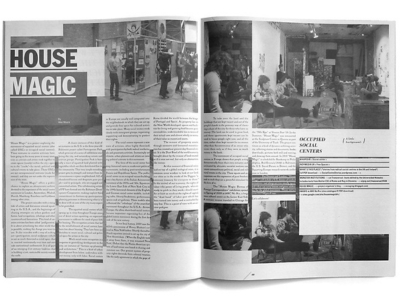
Over the years, PMI has developed a multifaceted approach to cultural programming, encompassing various platforms and initiatives. We have publications like Lumpen Magazine, a news and culture magazine (and PMI’s longest-running project) that has featured the work of emerging and established artists and writers for over three decades; Co-Prosperity, a 5,000+ square foot experimental cultural center and performance space in Bridgeport, showcasing emerging and established artists from Chicago and around the world; broadcasting through Lumpen Radio, a low-power community radio station broadcasting 24/7 multilingual content, serving local communities in Chicago’s Near South Side; retail initiatives like Buddy, a retail shop in the Chicago Cultural Center that promotes products by Chicago-based artists, makers, and small businesses; and regional collaborations like the MdW Coalition, an evolving regional coalition of artist-run projects, platforms, and spaces spanning across the Midwest to uncover and archive the region’s cultural and social ecologies.
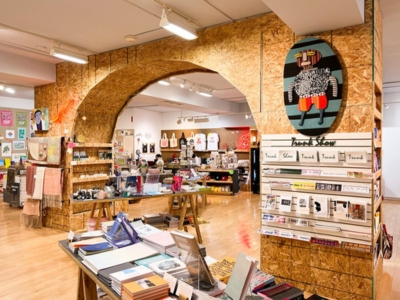
PMI’s diverse manifestations are driven by a commitment to adapt and respond to community needs. This adaptability has led to significant achievements, such as supporting 500 artists in selling their work, enabling over 100 Chicagoans to host radio shows, hosting more than a dozen exhibitions annually featuring over 100 artists each, and collaborating on over 25 movement events each year. This expansive approach allows PMI to say “yes” to a wide array of artists, independent journalists, and community members seeking support, fostering a broad suite of resources that address diverse needs. Despite operating without substantial financial reserves or assets, PMI remains committed to experimenting and evolving in response to community needs, embodying a counter-hegemonic force through means of production, and community mutual aid.
By embracing a wide range of initiatives and collaborations, PMI strives to create inclusive and welcoming communities, championing the work of historically oppressed producers and fostering a culture of mutual support and radical experimentation.
Nick Wylie: Maybe you could say that over the years, we have tried multiple things and some have failed and some have succeeded. It’s important to use our capacity to grow in the direction of need. We feel so strongly about this that, thanks to the MdW Coalition, we work across the Midwest with like-minded folks.
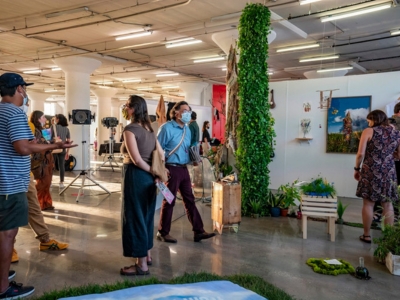
We have trouble saying no; we see so much more that we could do, and we barely skim the potential of each of our platforms. When a new volunteer or intern asks how they can support, it can be one of a thousand ways because we have so many irons in so many fires. We are not interested in excellence in one direction as much as we are a broad suite of resources that let us say, Yes, we can help you with that to most artists and independent journalists and weirdos who ask. There is obviously a capacity issue with that—and we don’t own a building, or have wealthy donors, or an endowment, or a cash reserve, or much in the way of assets at PMI—but we have always been scrappy and we continue to be, even as we grow, because we want to keep experimenting with what people say they need.
In some ways, we see glimmers of being a counter-hegemonic force through these means of production and community mutual aid, and sometimes we are just really gratified that we can help an organizing union, or protest group, or radical historian, or painter in some way. And it helps that we don’t have to show fancy wealth criminals that we are only selecting and amplifying some rarified crème de la crème for their trophy wall.
Each entity within the PMI ecosystem relies on a great deal of collaboration and co-creation. How do you do it?
Nick Wylie: Collaboration at Public Media Institute isn’t just a strategy—it’s our entire way of working, evolving, and staying resilient. At our core, we are a network of artists, organizers, and independent media makers who support each other across platforms, projects, and communities. While we’ve had to specialize more in recent years for efficiency’s sake, collaboration is still the glue that holds everything together. Most of us meet every week, helping each other out both materially and emotionally—pep-talking through difficulties, lending hands across projects, and constantly finding ways to make our work stronger together.
We wish we could collaborate even more. We dream of making radio shows about every artist we work with, developing thumb drive necklaces filled with samizdat files on vital resources for at-risk communities, breaking the internet with hacker collectives, and producing a trans buddy road comedy about American history at the end of empire. There’s no shortage of ideas, only time and capacity to take them on one by one. Even so, the partnerships we do forge run deep—whether it’s continuing to support the Prison + Neighborhood Arts/Education Project (PNAP)’s incarcerated artists as their show moves downstate; amplifying the work of Walls Turned Sideways, as they tell the stories of people newly free from the carceral system; or strengthening our Midwest-wide connections through the MdW network, publishing new dispatches from artist-run spaces across the region.
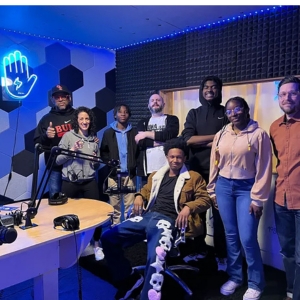
What makes this all possible? Trust, hospitality, and an unrelenting commitment to supporting each other’s work. Volunteers sustain Lumpen Radio, but so does the core team of Stephanie Manriquez, Charly Garcia, Ariandy Luna, and August Abitang, who uplift dozens of DJs and show hosts while creating their own vital programming, like The Mutual Aid Guide with Mario Smith and Boletín Migrante, which provides urgent updates for immigrant communities at risk of deportation. These shows are the result of long-standing relationships of trust and care.
At Co-Prosperity, our 29-person artist council is an organism of enthusiasm, nerdiness, and passion, stewarded by Ahniya Butler and SY Lim, who work closely with each selected artist and curator. Every exhibition is a collaboration, with council members jumping in as “buddies” to support planning, mounting, and celebrating each show. Meanwhile, the Buddy Shop team—led by Kimberly Kim, Sara Pardo, Seiya Abe-Bell, and Janelle Ayana Miller—does far more than keep the store running seven days a week. They work closely with artist collectives to develop new products, ensuring that the shop is not just a marketplace but a launchpad for artist-run initiatives.
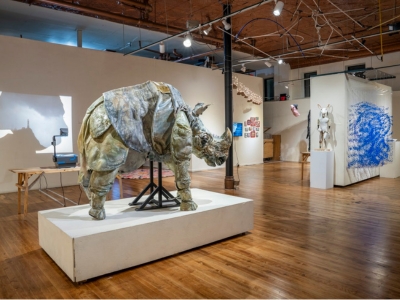
I’ve come to realize that while PMI operates as an organization, at certain moments—especially in times of urgent action, like at the DNC last year—we transform into something else. We become a collective of artists making something bigger than the sum of our parts. When we work together at full force, we’re a janky Voltron fighting a giant pig kaiju. While the work is exhausting, it’s also exhilarating because every collaboration, every mutual aid effort, every shared act of creation is another brick in the barricade we’re building together.
Coalition-making seems inherently built into everything you do. Did that evolve naturally, or was this an explicit value from the beginning around which you developed your value system?
Nick Wylie: Coalition-making has always been part of how we operate, but not because we sat down one day and drafted a manifesto about it. It evolved from necessity, from instinct, from the reality that if you want to make something happen, you need other people in the mix. Version Fest, a multi-day festival of curatorial projects, public interventions, musical events, and academic forums, was never just a festival—it was an experiment in assembling a network, in seeing what happens when you pull in artists, activists, weirdos, and thinkers from different orbits and crash them together. Info Expo did the same thing, gathering the disparate into a temporary commons. Every issue of Lumpen is another attempt to map and connect, to traffic-direct readers toward the intersections where solidarity can be built, where something unexpected might combust into action.
Organizing was always the only way forward. I don’t remember everything I learned at Marxist indoctrination camp as a kid, but I do remember the part about how capitalism will always open bigger floodgates of s**t onto us. If that’s inevitable, then you need people who know how to swim against the current. Or better yet, who can turn the s**t into something useful—fertilizer, fuel, or at the very least, a diagram in a magazine about all the ways pig s**t has been historically repurposed.
We can’t be the central hub for every response to collapse, but we can be a place that gets the word out about what’s possible. We can signal who is organizing, where to show up, what to eat, drink, read, listen to, and what performances are actually the good kind of political theatre. Sometimes, we even pull that off. And when we don’t, when we look dopey or messy while trying, we can say it’s camouflage—or just admit that we’re not here to crack some master code of cultural hegemony. We’re here to help artists and weirdos scatter a million needles in every direction at the giant [of capitalism] coming to step on us. Maybe one will hit the right nerve, or maybe the collective effect will be enough to slow it down. Either way, we keep moving, keep organizing, keep figuring out how to do this together.
From the outside, it looks as if keeping the momentum going within and behind this work takes a tremendous amount of effort.What does it feel like to you from the inside?
Nick Wylie: It feels like I’m writing these answers at 3:25am because I don’t want to disappoint our comrades at Court. Everybody copes in different ways. We try to encourage each other to take time off, but when we do, we inevitably go work on other projects.
Some of us care about making things perfect, sometimes we are relieved when a meeting is postponed; usually we rely on the artists, and DJs, and journalists, and activists we are working with to have patience with us, and recognize the autonomy we want to—and have to—share with them to make this possible. Since last year, we have been sharing our space with the Dissenters, who organize there on Sundays, and we welcome them to share the space with other movement groups, so long as there is a Dissenter member there to monitor the space and help out the group. We hope that, with more mutual support methods like this, we can keep sharing the load with the community more horizontally and expanding our capacity to read, and focus on keeping the platforms healthy and available. And some of us play video games to turn our brains off, or we turn to something else. Or we run, or play with dogs, or play music, or paint, or collect records, or make elaborate meals, or doom scroll, or go to GnarWare Workshop to make dog bowls, or visit family, or go on walks around Promontory Point with ice cream. People stuff. And then we keep writing about it at three in the morning, hoping our comrades at Court won’t hate editing this.
What are the best ways for people to support the Public Media Institute and all its tributaries?
Nick Wylie: We have zero major donors. If you know anyone in the position to be a sustaining major gift supporter, you will have done something no one in 35 years has been able to do. Or you can become a member at any level and join the hundreds of people who make this thing work without any gigantic individual donors.
Or you can come to our (all free) events and buy a beer and talk to the artist, or spread the word about Lumpen Radio (ideally to someone whose local business would like to underwrite). Or you can pitch an exhibition, or a radio show, or submit your book, or record, or poster, or hat or lamp that you made to show and sell at the Buddy Store.
Or you can say nice things about us!
Learn more about the Berlin public programs and PMI’s involvement here. Reservations for these programs are available now, and can be made online or by calling the Box Office at (773) 753-4472.
ED MARSZEWSKI is the Founding Director of Public Media Institute, the nonprofit corporation that programs the Co-Prosperity Sphere, produces the annual Version Festival, and publishes Lumpen Magazine, Proximity Magazine, Mash Tun Journal, and other titles. He is the President of Marz Community Brewing Co. He also makes artwork from time to time, focusing on housing rights issues and gentrification.
NICK WYLIE is an artist, organizer, and educator based in Chicago. Wylie was Founding Artistic Director at Mana Contemporary Chicago, a large art center in Pilsen from 2012–2015, and from 2015–2018, he served as Associate Director of Southern Exposure, a 45-year-old artist-run nonprofit in San Francisco. He has taught artmaking and arts administration courses at the School of the Art Institute of Chicago, University of Illinois at Chicago, and University of St. Francis. Wylie’s art practice, which incorporates video technology, performance, drawing, and queer futurity, has haunted galleries in Chicago and beyond for the past fifteen years. He received his BFA from Carnegie Mellon University, did post-baccalaureate work in Art History at Northwestern University, and went to University of Illinois at Chicago for his MFA.